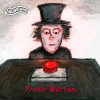
Joline Forshaw with Daniele Giovannoni of Karmamoi. Photograph reproduced with kind permisssion by Lunatic Eye and Karmamoi.
Arguably the centre of the Universe has to pass through Liverpool at some juncture; nothing else really can ever explain the abundance of musical talent that comes out of the city. Even those that have to live away from their beloved home still find that the passion for bringing new music into the world an overriding and natural part of the laws of attraction. Even for those based outside the sphere of arts in their daily life seek solace in it and for Karmamoi’s Joline Forshaw this is especially true.







